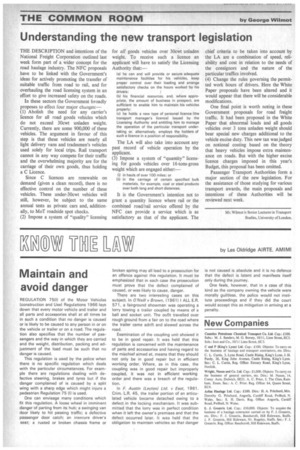Understanding the new transport legislation
Page 160

If you've noticed an error in this article please click here to report it so we can fix it.
THE DESCRIPTION and intentions of the National Freight Corporation outlined last week form part of a wider concept for the road haulage industry. The NFC proposals have to be linked with the Government's ideas for actively promoting the transfer of suitable traffic from road to rail, and for overhauling the road licensing system in an effort to give increased safety on the roads.
In these sectors the Government broadly proposes to effect four major changes:—
(1) Abolish the need for any carrier's licence for all road goods vehicles which do not exceed 30cwt unladen weight. Currently, there are some 900,000 of these vehicles. The argument in favour of this step is that these vehicles are nearly all light delivery vans and tradesmen's vehicles used solely for local trips. Rail transport cannot in any way compete for their traffic and the overwhelming majority are for the carriage of their own goods, thus holding a C Licence.
Since C licences are renewable on demand (given a clean record), there is no effective control on the number of these vehicles. These under-30cwt vehicles will still, however, be subject to the same annual tests as private cars and, additionally, to MoT roadside spot checks.
(2) Impose a system of "quality" licensing
for all goods vehicles over 30ewt unladen weight. To receive such a licence an applicant will have to satisfy the Licensing Authority that:—
(a) he can and will provide or secure adequate maintenance facilities for his vehicles, keep proper control over their loading and arrange satisfactory checks on the hours worked by his drivers:
111 his financial resources, and, where appropriate. the amount of business in prospect, are sufficient to enable him to maintain his vehicles properly;
id l he holds a new type of personal licence ithe transport manager's licence) issued by the Licensing Authority and entitling him to manage the operation of the particular transport undertaking or, alternatively, employs the holders of such a licence in a position of responsibility.
The LA will also take into account any past record of vehicle operation by the applicant.
(3) Impose a system of "quantity" licensing for goods vehicles over 16-tons-gross weight which are engaged either:—
(i) in hauls of over 100 miles; or (ill in the carriage of certain specified bulk materials, for example, coal or steel products over both long and short distances.
It is the Government's intention not to grant a quantity licence where rail or the combined road/rail service offered by the NFC can provide a service which is as satisfactory as that of the applicant. The
chief criteria to be taken into account by the LA are a combination of speed, reliability and cost in relation to the needs of the consignors and the nature of the particular traffics involved.
(4) Change the rules governing the permitted work hours of drivers. Here the White Paper proposals have been altered and it would appear that there will be considerable modifications.
One final point is worth noting in these Government proposals for road freight traffic. It had been proposed in the White Paper that abnormal loads and all goods vehicles over 3 tons unladen weight should bear special new charges additional to the vehicle excise duty. This new tax was judged on notional costing based on the theory that heavy vehicles impose extra maintenance on roads. But with the higher excise licence charges imposed in this year's Budget, this proposal has been omitted.
Passenger Transport Authorities form a major section of the new legislation. For the assistance of those studying for various transport awards, the main proposals and intentions of these Authorities will be reviewed next week.








































































































































































































